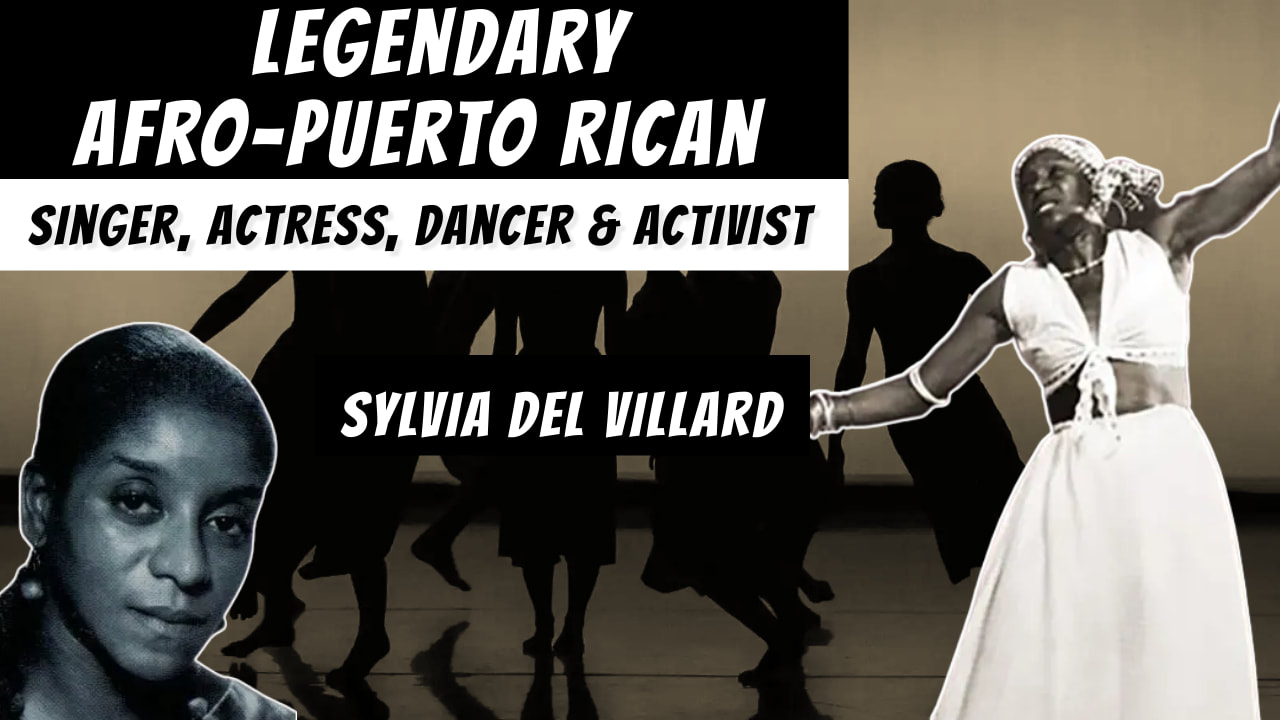|
One of the most notable Afro-Puerto Rican advocates, Sylvia del Villard, was born on February 28, 1928, in Santurce, Puerto Rico. She was the daughter of Agustín Villard and Marcolina Guilbert, parents who recognized their daughter was talented from a young age. Not only was Villard a very talented young girl, but she was an excellent student as well. She was one of the top students to graduate grade school in Santurce, Puerto Rico, her academic achievements earned her a scholarship from the Puerto Rican government to attend Fisk University in Nashville, Tennessee. As an Afro-Puerto Rican attending college in the southern United States in the late 1940s, she faced blatant racism on a regular basis, so much so that she decided to leave Fisk and attend the University of Puerto Rico, where she earned her bachelor’s degree. Following her graduation from the University of Puerto Rico, Villard returned to the United States and enrolled in the City College of New York. During this time, Villard’s life would change for the better. While living in Puerto Rico, Villard would start her professional career as a singer and poet in nightclubs, but her career would peak when she began receiving voice lessons from opera voice coach Leo Braun and Russian pianist Sonia Redd, as a student in New York. Villard joined a song and dance troupe called “Africa House” and she also became a member of the Carabalí Dancers. Being a part of these troupes exposed Villard to African history and culture. It was during this time she received her historical and cultural awakening. She was awakened to the beauty and richness of her African ancestry. From then on, she began integrating African poetry, music, dances, clothing, and culture into her performances. In 1979, Villard was invited to perform at the Pan-American Association Festival of the New World in Lagos, Nigeria. She also used her time in Nigeria to trace her family’s roots attempting to learn if her lineage traces back to Nigeria. In 1968, Villard founded the Afro-Boricua El Coqui Theater, an organization that was recognized as the authority on Afro-Puerto Rican culture by the Panamerican Association. The organization earned a contract to visit other countries to spread Afro-Puerto Rican culture. As a theater actress, she played a leading role in more than 14 productions. She was able to play a role in 3 movies that were professional productions. As a dancer and choreographer, she was able to star in 10 productions in Puerto Rico and the United States. During the 1970s, Villard founded the Luis Palés Matos Theater after her favorite poet, a theater she used to impact her community until it was forced to close down. It is said that the theater closed down because of Villard’s promotion of Afro-Puerto Rican culture. Following the closing of the theater, Villard moved back to New York where she founded the Soninke Company and became a teacher. In 1981, she became the first and only person as a director of the office of the Afro-Puerto Rican affairs of the Puerto Rican Institute of Culture. Sylvia del Villard died on February 28, 1990, due to lung cancer in Puerto Rico. She is remembered as one of, if not, the most outspoken people about Afro-Puerto Rican culture. Her spirit of activism was felt throughout her lifetime and is still being felt today. Her strength, courage, and tenacity are what helped her to live a legendary life. To Sylvia del Villard, we proudly stand on your shoulders. J.A. Ward Click here to support my OTSOG book series. References: https://centropr-archive.hunter.cuny.edu/centrovoices/arts-culture/sylvia-del-villard-afro-puerto-rican-activist-dancer-actress https://www.blackpast.org/african-american-history/sylvia-del-villard-1927-1990/ https://belatina.com/sylvia-del-villard-boricua-shero/
0 Comments
Leave a Reply. |
Details
Categories
All
Click Here to join our mailing list
|
Contact Us: |
Connect With Us |
Site powered by PIT Web Design


 RSS Feed
RSS Feed



